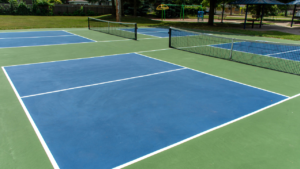Picture this: you step onto the sun-drenched court, paddle in hand, ready to conquer the world of pickleball. The sweet sound of the ball meeting the paddle, the sound of laughter echoing amidst the friendly competition; it’s a haven, a sanctuary for sports enthusiasts. But in the midst of all the excitement and camaraderie, there exists a silent code of conduct that goes beyond the mere rules of the game. It’s a secret language, conveyed not only through the flick of a wrist or the speed of a serve, but also through the delicate art of verbal warnings. Yes, my friends, in the world of pickleball, knowing when and how to mind your manners is just as important as mastering the perfect drop shot. Join us today as we explore the unspoken realm of verbal warnings in pickleball, where a mere whisper can bring harmony or disruption to the pickleball kingdom.
Table of Contents
- The Art of Verbal Warnings: A Path to Sportsmanship in Pickleball
- Understanding the Importance of Verbal Communication in Pickleball Etiquette
- Specific Situations Requiring Verbal Warnings: A Guide for Pickleball Players
- Mind Your Manners: Recommendations for Effective Verbal Warnings in Pickleball
- Avoiding Conflict: Strategies for Delivering Verbal Warnings in a Respectful Manner
- Q&A
- Concluding Remarks

The Art of Verbal Warnings: A Path to Sportsmanship in Pickleball
In the competitive world of pickleball, the art of verbal warnings holds a significant role in fostering sportsmanship among players. A well-executed verbal warning can not only defuse tension on the court but also establish a respectful and fair environment for all participants.
When delivering a verbal warning, it is crucial to maintain a calm and composed demeanor. By choosing the right words and tone, players can effectively communicate their concerns without escalating the situation. It is important to address the specific issue at hand, such as a player’s behavior, unsportsmanlike conduct, or rule violation, while maintaining respect for one’s opponents.
Here are some key elements to keep in mind when giving a verbal warning in pickleball:
- Clarity: Clearly state the reason for the warning, using concise and straightforward language. Use a confident yet respectful tone to ensure your message is understood.
- Consistency: Apply verbal warnings consistently to all players, regardless of their skill level or relationship with you. This promotes fairness and prevents any perception of bias.
- Timing: Deliver the warning in a timely manner, addressing the issue as soon as it arises. This prevents tensions from escalating and helps maintain a positive atmosphere on the court.
- Constructiveness: Offer constructive suggestions to players on how they can rectify their behavior or avoid rule violations in the future. This promotes personal growth and encourages a stronger sense of sportsmanship within the pickleball community.
By mastering the art of verbal warnings, players can contribute to the development of a respectful and sportsmanlike culture in pickleball. It is through effective communication and mutual respect that players can truly enjoy the game and foster long-lasting relationships within the pickleball community.

Understanding the Importance of Verbal Communication in Pickleball Etiquette
Pickleball, a delightful blend of tennis, badminton, and table tennis, is not just about playing the game; it’s also about embracing the spirit of sportsmanship and camaraderie on the court. Among the many elements of good pickleball etiquette, verbal communication stands out as a crucial component that keeps the game flowing smoothly and eliminates confusion among players.
Effective verbal communication in pickleball involves clear and concise instructions, ensuring that everyone on the court is aware of the ongoing play and potential risks. Calling out “mine” or “yours” when going for the ball helps prevent collisions and allows for better coordination between players. Additionally, communicating with your partner is key to creating effective strategies and maintaining a cohesive team. This not only enhances the gameplay but also fosters a sense of unity and mutual respect amongst all players.
To further improve communication, using hand signals alongside verbal cues can greatly enhance the clarity of your message. Simple hand gestures, such as pointing in the direction of your intended shot, can help your partner anticipate your moves and respond accordingly. Hand signals can also be used to indicate a switch in court positioning, creating a seamless transition during fast-paced rallies.
Remember, verbal communication is a valuable tool that creates a welcoming and inclusive atmosphere on the pickleball court. By mastering this aspect of etiquette, players can ensure a more enjoyable experience for themselves and others, reinforcing the true essence of pickleball beyond just a sport – a platform for connection and friendship.
Specific Situations Requiring Verbal Warnings: A Guide for Pickleball Players
Mastering pickleball not only involves technical skills but also understanding the etiquettes and rules that govern the game. In certain situations, players need to be aware of when a verbal warning is appropriate to maintain a fair and enjoyable playing environment. Here are some specific scenarios that may necessitate a verbal warning:
- Ball Interference: If a player unintentionally hinders their opponent’s ability to return the ball through distraction or obstruction, a verbal warning should be given as a gentle reminder. This ensures that the game proceeds smoothly without any unfair advantage.
- Line Disputes: In pickleball, line calls can sometimes be a source of contention. If players disagree on a line call due to different perspectives, giving a verbal warning can help diffuse the situation and remind players to maintain a respectful demeanor while discussing such disputes.
- Unsportsmanlike Behavior: In the spirit of sportsmanship, pickleball players are expected to show respect and fairness towards their opponents. If any player displays unsportsmanlike conduct, such as using offensive language, excessively celebrating points, or deliberately intending to injure opponents, a verbal warning should be issued to reestablish a positive playing atmosphere.
Remember, verbal warnings are meant to maintain a harmonious pickleball experience for all players. By being aware of these specific situations and using verbal warnings when necessary, the game can continue in a fair and enjoyable manner. Respect, communication, and adherence to the rules are key elements in creating a great pickleball playing environment.
Mind Your Manners: Recommendations for Effective Verbal Warnings in Pickleball
Recommendations for Effective Verbal Warnings in Pickleball
When playing pickleball, maintaining good sportsmanship and respectful behavior is essential for a positive and enjoyable experience. Verbal warnings play a crucial role in ensuring fair play and reminding players to adhere to the rules of the game. Here are some recommendations to keep in mind when delivering effective verbal warnings:
- Be clear and concise: When issuing a verbal warning, keep your message brief and to the point. Use simple language and avoid unnecessary jargon or complex explanations that may confuse the players.
- Stay calm and composed: It’s important to deliver warnings in a calm and composed manner, regardless of the situation. Maintaining a neutral tone will help prevent conflicts and ensure that players take the message seriously.
- Use a firm yet polite approach: Firmness is necessary to make players understand the gravity of their actions, but it should never be accompanied by rudeness or harshness. Maintain a polite demeanor while conveying your warning to maintain a positive playing atmosphere.
- Offer solutions and guidance: Instead of just pointing out the violation, provide players with helpful suggestions on how to correct their behavior or avoid similar infractions in the future. This not only helps them understand the mistake but also promotes a learning environment.
By implementing these recommendations, we can ensure that verbal warnings in pickleball contribute to enhancing gameplay and fostering a culture of respect among players. Let’s strive to make every match a harmonious and enjoyable experience for all!
Avoiding Conflict: Strategies for Delivering Verbal Warnings in a Respectful Manner
When it comes to delivering verbal warnings, it is crucial to maintain a respectful manner in order to avoid unnecessary conflicts. By employing effective strategies, you can address the issue at hand while still preserving the dignity and self-esteem of all individuals involved.
One important approach is to remain calm and composed throughout the conversation. Keep your tone steady and avoid sounding confrontational. This can help create an atmosphere of mutual respect and open communication.
Another strategy is to start the conversation by acknowledging the employee’s positive qualities or past achievements. This can help soften the blow of the warning and show that you value their contributions. However, be sure not to dwell on this for too long, as it may dilute the seriousness of the issue at hand.
- Use “I” statements: When delivering the warning, focus on expressing your own observations and feelings rather than making accusatory statements. This can help prevent the employee from becoming defensive and facilitate a more productive discussion.
- Be specific and provide examples: Clearly outline the behavior or performance concerns, providing concrete examples whenever possible. This helps ensure that both parties are on the same page regarding the issue and avoids any misunderstandings.
- Offer guidance and support: Rather than simply reprimanding, offer constructive suggestions on how the employee can improve. This demonstrates your commitment to their professional development and encourages them to take ownership of their actions.
Remember, delivering a verbal warning respectfully is not about sugarcoating the problem, but about fostering a positive and nurturing work environment where growth and improvement are encouraged. By implementing these strategies, you can minimize conflict and promote a culture of communication and respect within your team.
Q&A
### **What is the importance of verbal warnings in pickleball?**
Verbal warnings are crucial in pickleball as they help maintain a respectful and courteous environment on the court. They serve as a gentle reminder to players to adhere to the rules and show sportsmanship.
### **When should verbal warnings be used in pickleball?**
Verbal warnings should be used when a player unknowingly commits a minor infraction like a foot fault or a non-deliberate violation. It provides an opportunity for players to correct their behavior without immediate consequences.
### **How can verbal warnings be delivered effectively?**
When delivering a verbal warning in pickleball, it is important to remain calm and composed. Use a polite tone and provide clear information about the rule being broken. A respectful approach helps maintain a positive atmosphere on the court.
### **What is the purpose of verbal warnings instead of penalties or disqualifications?**
Verbal warnings aim to foster a sense of fairness and encourage good sportsmanship among pickleball players. By providing an opportunity to rectify minor infractions, it promotes a more inclusive and supportive playing environment.
### **Are there any potential drawbacks to relying solely on verbal warnings?**
While verbal warnings can be effective, there is a risk that some players may continue to commit minor infractions without consequence. In such cases, more severe penalties or disqualifications may be necessary to maintain the integrity of the game.
### **Do verbal warnings apply to both beginners and experienced players?**
Yes, verbal warnings apply to all players, regardless of their skill level. It is important to treat everyone equally and remind them of the rules and etiquette of the game so that pickleball remains enjoyable for everyone involved.
### **How can players avoid receiving verbal warnings in pickleball?**
To avoid receiving verbal warnings in pickleball, players should familiarize themselves with the rules and practice good sportsmanship. Staying mindful of their actions, being respectful to opponents and officials, and following the guidelines will help minimize the need for warnings.
Concluding Remarks
As the final rally comes to an end, it’s time for us to bid adieu to the world of verbal warnings in pickleball. We’ve delved deep into the realm of courteous play, ensuring every swing and every shout is infused with respect and sportsmanship.
Remember, in this vibrant game, our words have the power to either fuel the fire of friendly competition or dampen the spirits of fellow players. With each match, each whispered “sorry,” and each victorious high-five, we build a community that thrives on compassion and mutual respect.
Like the swift spin of the paddle, verbal warnings in pickleball serve as a gentle reminder that courtesy is key. By acknowledging our mistakes, communicating with care, and practicing good sportsmanship, we create an atmosphere where everyone can enjoy the thrill of battling it out on the court.
So, let’s carry these lessons beyond the boundaries of the pickleball court, for they extend far beyond the realm of sports. In our everyday lives, we encounter situations that call for patience, understanding, and consideration. Remembering the essence of a verbal warning helps us navigate these moments with grace, where the impact of our words can ripple through the lives of those around us.
As we part ways on this journey, let us take to heart the lessons we’ve learned together. Let us strive to make each interaction a testament to the joy of well-played games, whether it involves a friendly bout of pickleball or simply navigating the tapestry of life.
So, my dear readers, until we meet again on the vivid court of etiquette and good sportsmanship, may your shouts resound with kindness, your apologies be sincere, and may your love for pickleball unite communities far and wide. May the game continue to inspire us to mind our manners, on and off the court. Farewell, and may your pickleball journey be filled with countless aces and endless camaraderie!
As an affiliate, my content may feature links to products I personally use and recommend. By taking action, like subscribing or making a purchase, you’ll be supporting my work and fueling my taco cravings at the same time. Win-win, right?
Want to read more? Check out our Affiliate Disclosure page.




